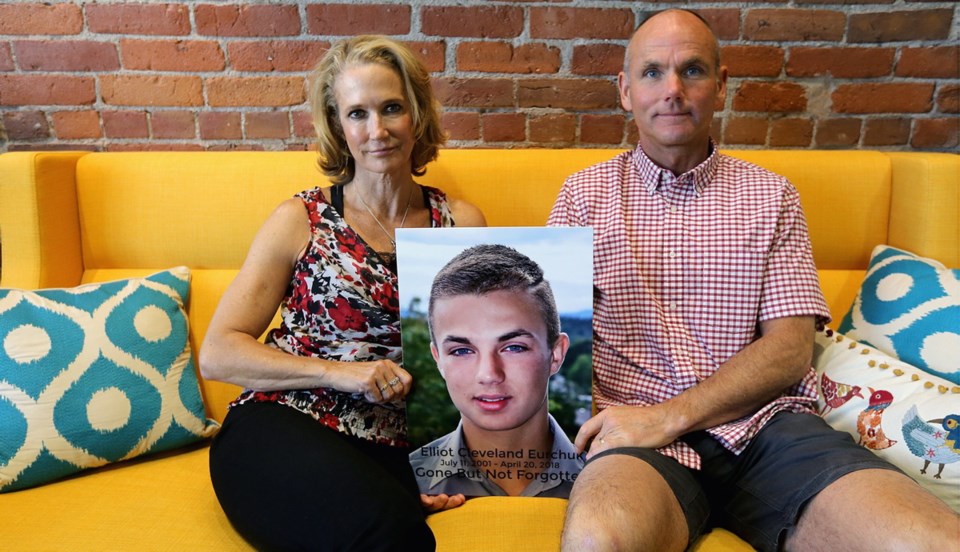Island Health has concluded its review into the overdose death of Oak Bay teen Elliot Eurchuk, promising to receive more information from parents and share more information with them. It will also review the charts of a dozen pediatric psychiatric patients by the fall.
Island Health said in a letter to parents Rachel Staples and Brock Eurchuk that after its review of their son’s care, it has developed four ways “to strengthen support across the system for others like Elliot.”
Eurchuk and Staples said they are disappointed with the results of the review. They were looking for directives, but instead there are vague “action items.”
Elliot, 16, died of an accidental illicit-opioid overdose in his Oak Bay home on April 20. His parents blame his death in part on opioid overprescribing, the hospital’s use of the B.C. Infants Act, which allowed him to dictate his own care and keep his medical records private, and his discharge from hospital without a care plan.
Dr. Richard Crow, acting vice-president of medicine, quality and academic affairs, said the health authority could not speak about Elliot specifically or the review’s findings, citing privacy laws.
The four “action items” are:
• Get more information from parents or caregivers.
• Give more information to parents or caregivers.
• Review about 12 pediatric psychiatric patient flow charts, to see where the care worked effectively or broke down.
• Share a summary of what was learned in the review of Elliot’s care with all health authorities.
Island Health is making “really significant improvements,” especially given its access to an unprecedented $10 million in provincial funding for mental-health and substance-use programs on Vancouver Island, Crow said.
In its letter to the parents, Island Health extends empathy, acknowledges no review can bring back Elliot, and offers to have its president sit down and discuss the “four actions specific to Elliot’s case to improve care for individuals in our care, particularly youth,” said Victoria Schmid, executive director of quality, safety and improvement.
The initiatives began in May.
“It’s better than nothing, but specifically how are we going to fix this situation so it doesn’t happen to another kid?” asked Staples, a Victoria dentist. “I don’t see the answers here. That’s why I am praying for a coroner’s inquest.”
The province wrote to the parents on July 6 to assure them that their thoughts and suggestions have been received and are “being considered in the development of potential policy, practice and legislative options.”
B.C.’s former child and youth watchdog said the Island Health response underscores the need for a coroner’s inquest. “It is a well-written but largely meaningless letter that rehashes items long promised, said Mary Ellen Turpel-Lafond, a law professor with the Peter A. Allard School of Law at the University of B.C. “The critical issues of consent, secure care, parental involvement, school support and addictions support are not adequately covered.”
Island Heath’s quality review is focused on finding improvements, not fault, and the findings are protected by privacy laws.
“A coroner’s inquest is a proper public airing of the key issues, and permits the family and others to appropriately address the central issue of not planning properly for Elliot’s needs or involving the family in that plan,” said Turpel-Lafond. “What really happened to Elliot, no one knows.”
Staples and Eurchuk have engaged Turpel-Lafond to be part of a legal team with Victoria lawyer Michael Scherr, asking B.C. coroner Lisa Lapointe to order an inquest into Elliot’s death, or in the event she does not, asking Solicitor General Mike Farnworth to compel one.
Eurchuk said he would have liked to hear from Island Health an acknowledgment of the health-care system’s numerous failures to care for Elliot.
“An apology from the various institutions that failed Elliot implies a need to react, to respond, to make improvements that will not let another preventable death occur,” said Eurchuk.
Eurchuk said being a parent is his greatest gift, and his instinct to love, protect and support Elliot permeated his every thought and action.
“For the rest of my life I will bear the challenge of confronting my own failure as Elliot’s father,” he said.
Elliot would have celebrated his 17th birthday on July 11.



